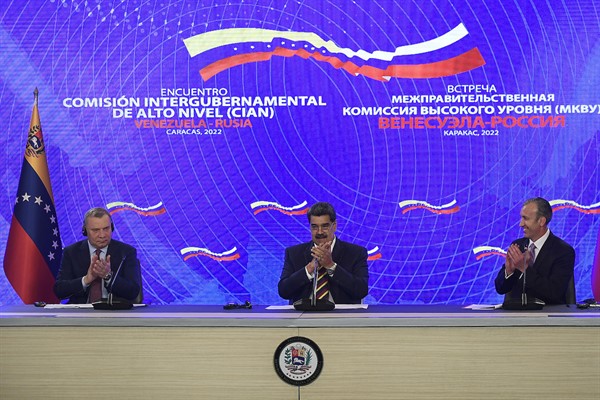Almost 6,500 miles separate Caracas from Kyiv, but the protracted political crisis in Venezuela, with its attendant humanitarian emergency, is not immune to spillover from the war in Ukraine. As if Venezuela’s challenges were not already sufficiently hard to resolve, the progressive build-up of geopolitical tensions over recent years has produced a fresh layer of complexity, highlighted as never before by Moscow’s threat to expand its presence in the Americas in retaliation for NATO moves in Europe. But can foreign powers, despite their deepening adversarial stance elsewhere, somehow harness their efforts to facilitate a solution in Venezuela?
In January, as the saber-rattling over Ukraine grew louder, Russian Deputy Foreign Minister Sergei Ryabkov pointedly refused to rule out an enhanced Russian military presence in Venezuela, as well as elsewhere around the Caribbean, in response to NATO’s expansion in Eastern Europe. U.S. national security adviser Jake Sullivan described the threat as “bluster,” and military analysts point out that Russia has minimal capacity to project force in the Western Hemisphere. But while the Kremlin later appeared to play down the suggestion, a Feb. 16 visit by Deputy Prime Minister Yuri Borisov to Caracas, Havana and Managua underlined the fact that the Maduro government now has a walk-on part in the Ukrainian drama.
During Borisov’s visit, Venezuelan President Nicolas Maduro spoke of increasing the two countries’ “powerful” military cooperation and expressed full support for Russia’s stance on Ukraine, even if he shied away from recognizing the “independence” Donetsk and Luhansk. His remarks came as tentative moves were afoot in Caracas, Washington and Bogota to restart stalled talks in Mexico City between the Maduro government and the opposition. Maduro’s swift alignment with his Russian ally was unhelpful in this regard, to say the least. Reciprocal concessions between the two sides in the Venezuelan dispute, potentially involving sanctions relief from the U.S. in exchange for moves toward the restoration of democracy by Caracas, already looked unlikely. Nevertheless, Venezuela’s seeming reluctance to echo Moscow’s position on Ukraine’s two separatist regions left the door for compromise open at least a crack.

